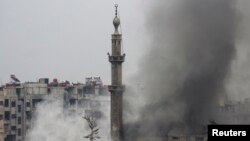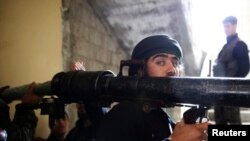CAIRO —
Syrian government forces shelled several districts of Damascus Thursday during a second day of fierce fighting with rebels in and around the capital.
Amateur video showed smoke rising from the southern districts of Damascus as shells crashed into areas that rebel forces have tried to seize from the government.
Witnesses say elite government units located along northern heights of the capital used field artillery to slow the rebel advance.
Syrian state television reported that a "government offensive" had pushed rebels out of the south-eastern Damascus district of Joubar. The report also said that rebel forces shelled a pro-government northern district of the city, killing several people.
Neither government nor rebel accounts can be independently verified as Syria does not permit journalists to report freely.
Arab media reported that Syrian government troops were also battling to retake a portion of the southern ring highway that rebels had captured Wednesday. The rebel control prevents government access to the main north-south highway to the southern city of Daraa.
Amateur video also showed heavy government shelling in Daraa. Recent reports say the government had lost significant chunks of the flashpoint southern city and that the rebels appear to be better armed there.
Conflict rages
Analyst Nadim Shehadi of Chatham House in London said the fighting inside the capital and elsewhere makes it difficult to envision a positive end to the conflict.
"What is happening on the ground is the worst case scenario," Shehadi said. "There are three possible outcomes, all of them bad. If the regime wins it's bad. If the opposition wins it's bad. If nobody wins, it's worse."
"So, I don't think that one should leave developments on the ground to reach an outcome. There has to be an international policy," he said.
But Shehadi said political and diplomatic efforts have proved futile so far. He said a recent initiative by exiled Syrian opposition leader Mouaz al-Khatib to negotiate with the government "reveals the futility of any attempt to talk to the government."
"The regime," Shehadi said, "does not want dialogue and the Syrian people won't accept a dialogue that will leave the regime in place."
Khatib is demanding the government release all women captives it holds before Sunday or his offer for dialogue will be rescinded.
Amateur video showed smoke rising from the southern districts of Damascus as shells crashed into areas that rebel forces have tried to seize from the government.
Witnesses say elite government units located along northern heights of the capital used field artillery to slow the rebel advance.
Syrian state television reported that a "government offensive" had pushed rebels out of the south-eastern Damascus district of Joubar. The report also said that rebel forces shelled a pro-government northern district of the city, killing several people.
Neither government nor rebel accounts can be independently verified as Syria does not permit journalists to report freely.
Arab media reported that Syrian government troops were also battling to retake a portion of the southern ring highway that rebels had captured Wednesday. The rebel control prevents government access to the main north-south highway to the southern city of Daraa.
Amateur video also showed heavy government shelling in Daraa. Recent reports say the government had lost significant chunks of the flashpoint southern city and that the rebels appear to be better armed there.
Conflict rages
Analyst Nadim Shehadi of Chatham House in London said the fighting inside the capital and elsewhere makes it difficult to envision a positive end to the conflict.
"What is happening on the ground is the worst case scenario," Shehadi said. "There are three possible outcomes, all of them bad. If the regime wins it's bad. If the opposition wins it's bad. If nobody wins, it's worse."
"So, I don't think that one should leave developments on the ground to reach an outcome. There has to be an international policy," he said.
But Shehadi said political and diplomatic efforts have proved futile so far. He said a recent initiative by exiled Syrian opposition leader Mouaz al-Khatib to negotiate with the government "reveals the futility of any attempt to talk to the government."
"The regime," Shehadi said, "does not want dialogue and the Syrian people won't accept a dialogue that will leave the regime in place."
Khatib is demanding the government release all women captives it holds before Sunday or his offer for dialogue will be rescinded.





